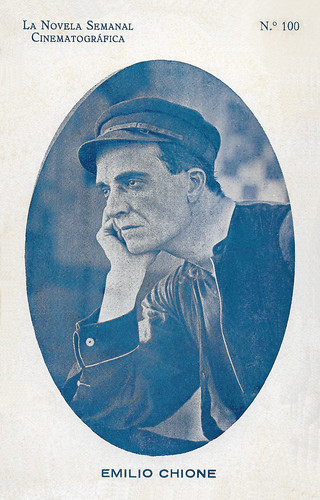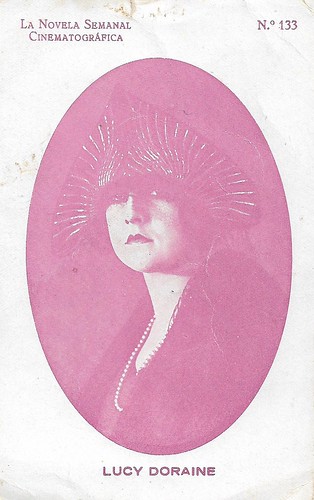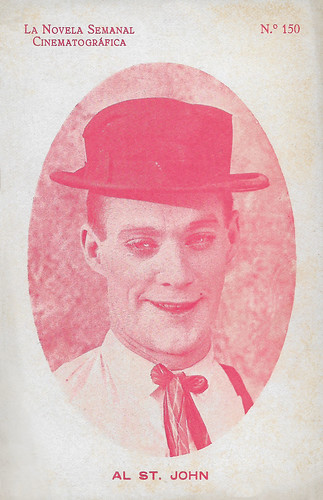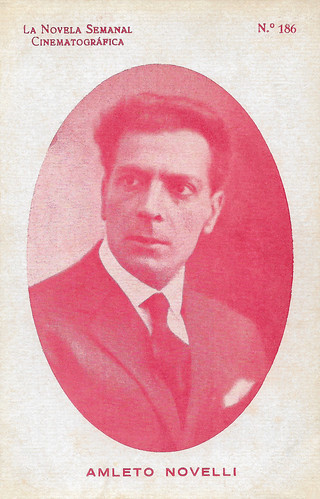Today the second and last part of our post about the postcards published by the Spanish magazine 'La Novela Semanal Cinematográfica'. Yesterday we posted 25 cards, today the second series of 25 plus one. Again it's a combination of Hollywood and European stars of the early 1920s, including several German silent film stars this time. The complete series must have counted circa 460 cards*.

Spanish card by La Novela Semanal Cinematográfica, no. 90.
Jack Pickford (1896-1933) was a Canadian-born American actor, film director, and producer. He was the younger brother of Mary Pickford. While Jack also appeared in numerous films as the 'All American boy next door' and was a fairly popular performer, he was overshadowed by his sister's success. Also, by the late 1920s, his career had begun to decline due to alcohol, drugs, scandals, and chronic depression.

Spanish card by La Novela Semanal Cinematográfica, no. 93.
Marguerite 'Marg' Madys (1899–1986) was a French actress, born Alice Marguerite Blandin. She had a rich career in 1920s French silent cinema, acting in e.g. the serial L'Enfant-Roi (Jean Kemm, 1923), based on a fictive story to save the French dauphin from the guillotine.

Spanish card by La Novela Semanal Cinematográfica, no. 98.
Willam Russell (1884-1929) was an American popular actor of the silent screen. He became a star in Western comedies. Russell died already at age 44 in 1929.

Spanish card by La Novela Semanal Cinematográfica, no. 99.
Patsy Ruth Miller (1904-1995) was an American film actress who played Esmeralda in the silent version of The Hunchback of Notre Dame (1923) opposite Lon Chaney. After a few early talkies, she retired in 1931. She later became known as a prize-winning writer.

Spanish card by La Novela Semanal Cinematográfica, no. 100.
Emilio Ghione (1879-1930) was an Italian silent film actor, director, and screenwriter. He is best known for writing, directing, and starring in the Za La Mort series of adventure films, in which he played a likable French apache and 'honest outlaw.'

Spanish card by La Novela Semanal Cinematográfica, no. 103.
American film actress Mildred Harris (1901-1944) began her career in the film industry as a child actress when she was 11 years old. She was also the first wife of Charlie Chaplin.

Spanish card by La Novela Semanal Cinematográfica, no. 104.
Charles de Rochefort (1887-1952) was a star of the French silent cinema. He appeared in 34 films between 1911 and 1932. In 1923 he went to the US and as Charles De Roche, he made several films in Hollywood. After his return to France, he became a film director of sound films.

Spanish postcard by La Novela Semanal Cinematografica, no. 105.
Enid Bennett (1893-1969) was an Australian-born silent film actress, mostly active in the American cinema. She peaked in the late 1910s and early 1920s with films such as Robin Hood (1922), starring Douglas Fairbanks, and The Sea Hawk (1924). In the sound era, she played Jackie Cooper's mother in the Oscar-winning film Skippy (1931). She was the wife of director Fred Niblo and after his death of director Sidney Franklin.

Spanish card by La Novela Semanal Cinematográfica, no. 109.
American soprano opera singer and film actress Geraldine Farrar (1882-1967) was noted for her glamorous beauty, acting ability, and the timbre of her voice. Barely 20, she was already the toast of Berlin. Later at the Met in New York, she had a large following among young women, who were nicknamed ‘Gerry-flappers’. Farrar also starred in more than a dozen silent films from 1915 to 1920. She was married to and co-starred with Dutch matinee idol Lou Tellegen.

Spanish card by La Novela Semanal Cinematográfica, no. 113.
Ginette Maddie (1898-1980) was a French actress who acted in French and German silent films. Between 1922 and 1958, she appeared in 20 films with such notable directors as Alfred Machin and Julien Duvivier.

Spanish postcard by La Novela Semanal Cinematografica, no. 114.
John Barrymore (1882-1942) was an American stage and screen actor whose rise to superstardom and subsequent decline is one of the legendary tragedies of Hollywood. A member of the most famous generation of the most famous theatrical family in America, he was also its most acclaimed star. He excelled in high drama, in productions of 'Justice' (1916), 'Richard III' (1920) and 'Hamlet' (1922). After a success as Hamlet in London in 1925, Barrymore left the stage for 14 years and instead focused entirely on films.

Spanish card by La Novela Semanal Cinematográfica, no. 115.
Louise Lorraine (1904-1981) was an American film actress, who started out in two-reel comedies for independent studios, then spent time at MGM and Universal. She became very popular in action-filled silent serials and may be best remembered for being the third actress to portray Jane, in the serial The Adventures of Tarzan (1921). In 1930, she retired from the film industry.

Spanish postcard by La Novela Semanal Cinematográfica, no. 116.
Febo Mari (1881-1939) was an Italian actor, director, and writer of the stage, screen, and radio, who peaked in the 1910s with films such as Il fuoco (1915), Cenere (1916) and Il fauno (1917).

Spanish postcard by La Novela Semanal Cinematográfica, no. 133.
Despite her French name, Lucy Doraine (1898-1989) was a major Austrian-Hungarian actress in the Austrian and German cinema of the 1920s. When she moved to Hollywood, the revolution of the sound film finished her career.

Spanish card by La Novela Semanal Cinematográfica, no. 136.
J. (Jack) Warren Kerrigan (1879-1947) was an American actor of the silent screen. From 1910, he had a most active career first in shorts at Essanay, American at Victor, then in features at Universal. After a gap in the early 1920s, he came back with a bang in James Cruze's The Covered Wagon (1923) but stopped acting in 1924 after a car accident.

Spanish postcard by La Novela Semanal Cinematográfica, no. 139.
Lee Parry (1901-1977) was a glamorous German film actress of the silent and the early sound era. She often starred in films by her husband Richard Eichberg. She appeared in 48 films between 1919 and 1939.

Spanish postcard by La Novela Semanal Cinematográfica, no. 143.
Lya Mara (1897-1969) was one of the biggest stars of the German silent cinema. Her stardom was even the subject of a novel, which was published in 100 episodes between 1927 and 1928. Her career virtually ended after the arrival of sound film.

Spanish postcard by La Novela Semanal Cinematografica, no. 148.
Conrad Veidt (1893–1943) was the 'most highly strung and romantically handsome of the German expressionist actors'. From 1916 until his death, he appeared in over 100 films, including such classics as Das Cabinet des Dr. Caligari (1920) as the sleep-walking killer Cesare, and Casablanca (1942) as Nazi Major Heinrich Strasser. He played in the 'first gay film', Anders als die Andern (1919) and his starring role in The Man Who Laughs (1928) was the inspiration for Batman's greatest enemy, The Joker.

Spanish card by La Novela Semanal Cinematográfica, no. 150.
Al St. John (1892-1963) was an early American film comedian, and nephew of Roscoe 'Fatty' Arbuckle, with whom he often appeared. He played in dozens of Mack Sennett's early Keystone comedies and worked with Charlie Chaplin, Buster Keaton, and Mabel Normand. He would eventually create and star in his own vehicles for other studios. In the sound era, he was the sidekick of B-Western heroes like Bob Steele and Buster Crabbe. He played the scruffy comedy relief character 'Fuzzy Q. Jones' in the Billy the Kid series (1940-1946), and the Lone Rider series (1941-1943). From 1912 to 1952, Al St. John acted in 346 films.

Spanish card by La Novela Semanal Cinematográfica, no. 167.
Shirley Mason (1901-1979) was an American actress of the silent era. She was a sister of Viola Dana. She made her film debut at the age of 10. Between 1910 and 1929, she made more than 110 films.

Spanish postcard by La Novela Semanal Cinematografica, no. 186.
Amleto Novelli (1885-1924) was a famous actor in Italian silent cinema, as well in epic and historical cinema as in diva films.

Spanish postcard by La Novela Semanal Cinematografica, no. 353.
German, but Dutch-born film actress Lil Dagover (1887-1980) was an exotic, dark beauty, who featured prominently during the golden age of the German silent cinema. She had her breakthrough as the prey of Dr. Caligari's monster in the classic expressionist film Das Cabinet des Dr. Caligari (1920) but gradually her fine and evanescent beauty changed and she turned into a 'Salondame', a lady of the screen. Her career would span nearly six decades.

Spanish card by La Novela Semanal Cinematográfica, no. 372.
Jean Hersholt (1886-1956) was a Danish-born actor who lived in the United States, where he appeared in 75 silent films and 65 sound films and directed four films. He was best known for his villain role in Erich von Stroheim's classic Greed (1924) and as Shirley Temple's grandfather in Heidi (1937). For 17 years he starred on American radio in 'Dr. Christian'.

Spanish postcard by La Novela Semanal Cinematográfica, no. 399.
American comedian Charles Murray (1872-1941) worked with George Sydney on a series of comedies around the Jewish Nate Cohen and the Irish-Catholic Patrick Kelly, two business partners who are constantly fighting. Murray appeared in 283 films between 1912 and 1938, and also directed 5 films.
* Troy Kirk's The Movie Card Website contains a list of the La Novela Semanal Cinematográfica cards, which goes as far as number 455.

Spanish card by La Novela Semanal Cinematográfica, no. 90.
Jack Pickford (1896-1933) was a Canadian-born American actor, film director, and producer. He was the younger brother of Mary Pickford. While Jack also appeared in numerous films as the 'All American boy next door' and was a fairly popular performer, he was overshadowed by his sister's success. Also, by the late 1920s, his career had begun to decline due to alcohol, drugs, scandals, and chronic depression.

Spanish card by La Novela Semanal Cinematográfica, no. 93.
Marguerite 'Marg' Madys (1899–1986) was a French actress, born Alice Marguerite Blandin. She had a rich career in 1920s French silent cinema, acting in e.g. the serial L'Enfant-Roi (Jean Kemm, 1923), based on a fictive story to save the French dauphin from the guillotine.

Spanish card by La Novela Semanal Cinematográfica, no. 98.
Willam Russell (1884-1929) was an American popular actor of the silent screen. He became a star in Western comedies. Russell died already at age 44 in 1929.

Spanish card by La Novela Semanal Cinematográfica, no. 99.
Patsy Ruth Miller (1904-1995) was an American film actress who played Esmeralda in the silent version of The Hunchback of Notre Dame (1923) opposite Lon Chaney. After a few early talkies, she retired in 1931. She later became known as a prize-winning writer.

Spanish card by La Novela Semanal Cinematográfica, no. 100.
Emilio Ghione (1879-1930) was an Italian silent film actor, director, and screenwriter. He is best known for writing, directing, and starring in the Za La Mort series of adventure films, in which he played a likable French apache and 'honest outlaw.'

Spanish card by La Novela Semanal Cinematográfica, no. 103.
American film actress Mildred Harris (1901-1944) began her career in the film industry as a child actress when she was 11 years old. She was also the first wife of Charlie Chaplin.

Spanish card by La Novela Semanal Cinematográfica, no. 104.
Charles de Rochefort (1887-1952) was a star of the French silent cinema. He appeared in 34 films between 1911 and 1932. In 1923 he went to the US and as Charles De Roche, he made several films in Hollywood. After his return to France, he became a film director of sound films.

Spanish postcard by La Novela Semanal Cinematografica, no. 105.
Enid Bennett (1893-1969) was an Australian-born silent film actress, mostly active in the American cinema. She peaked in the late 1910s and early 1920s with films such as Robin Hood (1922), starring Douglas Fairbanks, and The Sea Hawk (1924). In the sound era, she played Jackie Cooper's mother in the Oscar-winning film Skippy (1931). She was the wife of director Fred Niblo and after his death of director Sidney Franklin.

Spanish card by La Novela Semanal Cinematográfica, no. 109.
American soprano opera singer and film actress Geraldine Farrar (1882-1967) was noted for her glamorous beauty, acting ability, and the timbre of her voice. Barely 20, she was already the toast of Berlin. Later at the Met in New York, she had a large following among young women, who were nicknamed ‘Gerry-flappers’. Farrar also starred in more than a dozen silent films from 1915 to 1920. She was married to and co-starred with Dutch matinee idol Lou Tellegen.

Spanish card by La Novela Semanal Cinematográfica, no. 113.
Ginette Maddie (1898-1980) was a French actress who acted in French and German silent films. Between 1922 and 1958, she appeared in 20 films with such notable directors as Alfred Machin and Julien Duvivier.

Spanish postcard by La Novela Semanal Cinematografica, no. 114.
John Barrymore (1882-1942) was an American stage and screen actor whose rise to superstardom and subsequent decline is one of the legendary tragedies of Hollywood. A member of the most famous generation of the most famous theatrical family in America, he was also its most acclaimed star. He excelled in high drama, in productions of 'Justice' (1916), 'Richard III' (1920) and 'Hamlet' (1922). After a success as Hamlet in London in 1925, Barrymore left the stage for 14 years and instead focused entirely on films.

Spanish card by La Novela Semanal Cinematográfica, no. 115.
Louise Lorraine (1904-1981) was an American film actress, who started out in two-reel comedies for independent studios, then spent time at MGM and Universal. She became very popular in action-filled silent serials and may be best remembered for being the third actress to portray Jane, in the serial The Adventures of Tarzan (1921). In 1930, she retired from the film industry.

Spanish postcard by La Novela Semanal Cinematográfica, no. 116.
Febo Mari (1881-1939) was an Italian actor, director, and writer of the stage, screen, and radio, who peaked in the 1910s with films such as Il fuoco (1915), Cenere (1916) and Il fauno (1917).

Spanish postcard by La Novela Semanal Cinematográfica, no. 133.
Despite her French name, Lucy Doraine (1898-1989) was a major Austrian-Hungarian actress in the Austrian and German cinema of the 1920s. When she moved to Hollywood, the revolution of the sound film finished her career.

Spanish card by La Novela Semanal Cinematográfica, no. 136.
J. (Jack) Warren Kerrigan (1879-1947) was an American actor of the silent screen. From 1910, he had a most active career first in shorts at Essanay, American at Victor, then in features at Universal. After a gap in the early 1920s, he came back with a bang in James Cruze's The Covered Wagon (1923) but stopped acting in 1924 after a car accident.

Spanish postcard by La Novela Semanal Cinematográfica, no. 139.
Lee Parry (1901-1977) was a glamorous German film actress of the silent and the early sound era. She often starred in films by her husband Richard Eichberg. She appeared in 48 films between 1919 and 1939.

Spanish postcard by La Novela Semanal Cinematográfica, no. 143.
Lya Mara (1897-1969) was one of the biggest stars of the German silent cinema. Her stardom was even the subject of a novel, which was published in 100 episodes between 1927 and 1928. Her career virtually ended after the arrival of sound film.

Spanish postcard by La Novela Semanal Cinematografica, no. 148.
Conrad Veidt (1893–1943) was the 'most highly strung and romantically handsome of the German expressionist actors'. From 1916 until his death, he appeared in over 100 films, including such classics as Das Cabinet des Dr. Caligari (1920) as the sleep-walking killer Cesare, and Casablanca (1942) as Nazi Major Heinrich Strasser. He played in the 'first gay film', Anders als die Andern (1919) and his starring role in The Man Who Laughs (1928) was the inspiration for Batman's greatest enemy, The Joker.

Spanish card by La Novela Semanal Cinematográfica, no. 150.
Al St. John (1892-1963) was an early American film comedian, and nephew of Roscoe 'Fatty' Arbuckle, with whom he often appeared. He played in dozens of Mack Sennett's early Keystone comedies and worked with Charlie Chaplin, Buster Keaton, and Mabel Normand. He would eventually create and star in his own vehicles for other studios. In the sound era, he was the sidekick of B-Western heroes like Bob Steele and Buster Crabbe. He played the scruffy comedy relief character 'Fuzzy Q. Jones' in the Billy the Kid series (1940-1946), and the Lone Rider series (1941-1943). From 1912 to 1952, Al St. John acted in 346 films.

Spanish card by La Novela Semanal Cinematográfica, no. 167.
Shirley Mason (1901-1979) was an American actress of the silent era. She was a sister of Viola Dana. She made her film debut at the age of 10. Between 1910 and 1929, she made more than 110 films.

Spanish postcard by La Novela Semanal Cinematografica, no. 186.
Amleto Novelli (1885-1924) was a famous actor in Italian silent cinema, as well in epic and historical cinema as in diva films.

Spanish postcard by La Novela Semanal Cinematografica, no. 353.
German, but Dutch-born film actress Lil Dagover (1887-1980) was an exotic, dark beauty, who featured prominently during the golden age of the German silent cinema. She had her breakthrough as the prey of Dr. Caligari's monster in the classic expressionist film Das Cabinet des Dr. Caligari (1920) but gradually her fine and evanescent beauty changed and she turned into a 'Salondame', a lady of the screen. Her career would span nearly six decades.

Spanish card by La Novela Semanal Cinematográfica, no. 372.
Jean Hersholt (1886-1956) was a Danish-born actor who lived in the United States, where he appeared in 75 silent films and 65 sound films and directed four films. He was best known for his villain role in Erich von Stroheim's classic Greed (1924) and as Shirley Temple's grandfather in Heidi (1937). For 17 years he starred on American radio in 'Dr. Christian'.

Spanish postcard by La Novela Semanal Cinematográfica, no. 399.
American comedian Charles Murray (1872-1941) worked with George Sydney on a series of comedies around the Jewish Nate Cohen and the Irish-Catholic Patrick Kelly, two business partners who are constantly fighting. Murray appeared in 283 films between 1912 and 1938, and also directed 5 films.
* Troy Kirk's The Movie Card Website contains a list of the La Novela Semanal Cinematográfica cards, which goes as far as number 455.
No comments:
Post a Comment